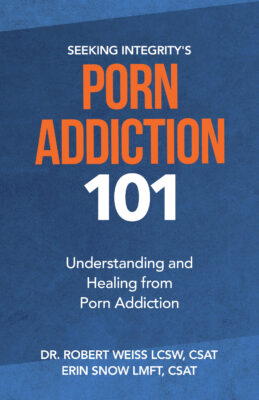Porn Addiction: Couples Healing
 Erin Snow
Erin Snow
Porn addicts who are in a long-term relationship when they enter recovery and begin the process of healing may want to consider, in addition to other forms of support, couples counseling. That said, couples counseling should occur at the right time and for the right reasons. Otherwise, it may be counterproductive.
Generally, we recommend that porn addicts and their partners focus on individual work for the first several months of recovery. Couples work can wait. At Seeking Integrity, we recommend this for two primary reasons:
- Couples counseling can be emotionally difficult, and if the addict is not grounded in recovery, they may relapse to quell the feelings that come up.
- Couples counseling relies heavily on honest communication, and newly recovering addicts tend to struggle with this, making couples work less than productive.
 When both partners (but especially the addict) have sufficiently progressed in their individual healing, couples counseling can be quite helpful. Usually, couples therapy works best when both the addict and the betrayed partner have an individual therapist, too, where their own well-being is the primary concern. In couples counseling, neither individual is viewed as the primary client. Instead, the therapist will focus on helping the relationship heal. The relationship, rather than either of the individuals, is the client.
When both partners (but especially the addict) have sufficiently progressed in their individual healing, couples counseling can be quite helpful. Usually, couples therapy works best when both the addict and the betrayed partner have an individual therapist, too, where their own well-being is the primary concern. In couples counseling, neither individual is viewed as the primary client. Instead, the therapist will focus on helping the relationship heal. The relationship, rather than either of the individuals, is the client.
Ideally, couples counselors should be familiar with sex and porn addiction and the process of healing. Otherwise, they may be highly reactive to the addict’s behaviors, and that helps nobody. Addicts and their partners also want a therapist who understands the need for and process of Full Therapeutic Disclosure. For both of these reasons, the best bet for couples work is a CSAT-certified couples therapist.
Full Therapeutic Disclosure (FTD) is exactly what it sounds like—a process where the addict discloses everything about the addiction (in non-graphic, non-triggering language) to the betrayed partner. This is a process that occurs over the course of several weeks, usually starting three to six months into the addict’s recovery process—after the addict has broken through denial and is finally capable of being fully honest with self and others. At all stages of this process, each person’s individual therapist, as well as the couples counselor, are present and fully involved.
There are some excellent books on how to best conduct FTD, and all CSATs are trained in the process, so we will not delve into that too deeply here. Instead, I will simply say that if porn addicts want to heal their damaged relationship, they’re almost certainly going to need to do an FTD. Moreover, betrayed partners of porn addicts nearly always want and need an FTD as part of both their individual and relational healing. When everything is finally out in the open, both partners and the relationship can finally move forward.
The alternative to the FTD process is known as “trickle truth.” This occurs when addicts reveal or betrayed partners discover information a little bit at a time. Many of my CSAT colleagues refer to this as “death by paper cut,” and that’s a pretty good description. Rather than coming clean with the truth in a piecemeal fashion, it is best for both partners and the relationship to wait for a therapeutically supervised disclosure process.
* * * * * * * * * *
If you or a loved one are struggling with sex, porn, or substance/sex addiction, Seeking Integrity can help. In addition to residential rehab, we offer low-cost online workgroups for male sex addicts and male porn addicts new to recovery. Click HERE for information on our Sex Addiction Workgroup. Click HERE for information on our Porn Addiction workgroup.
